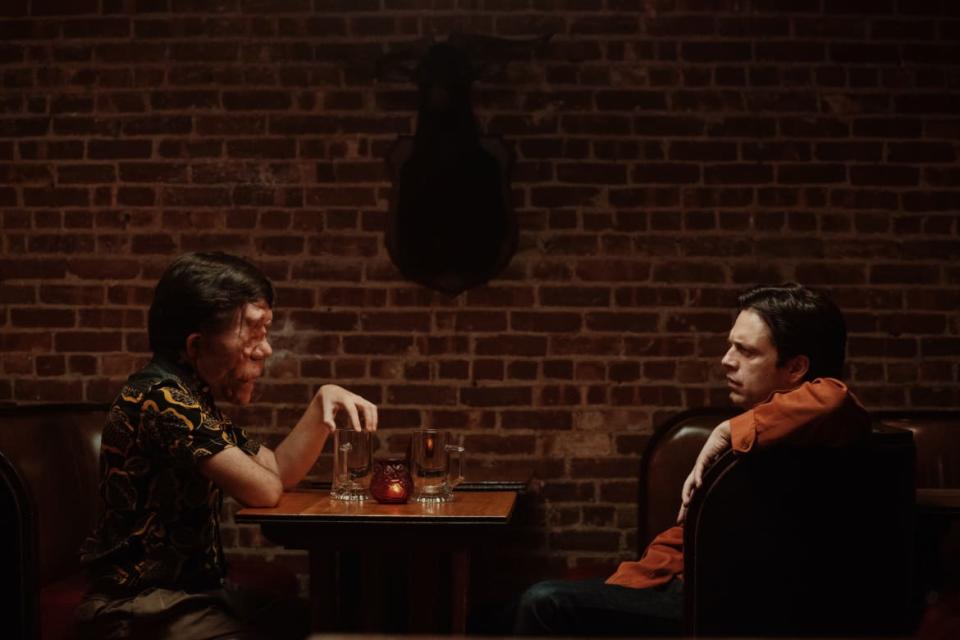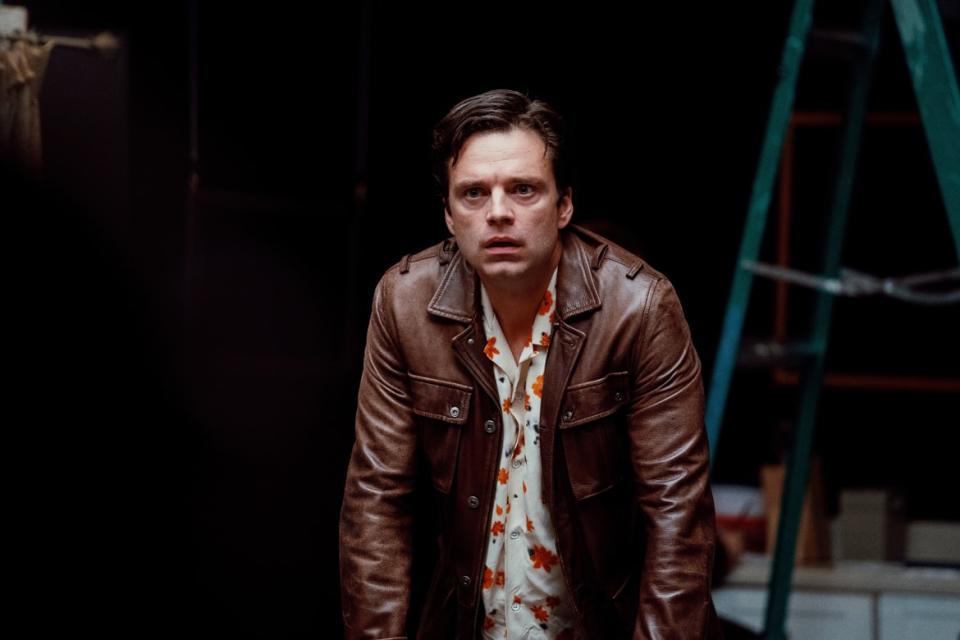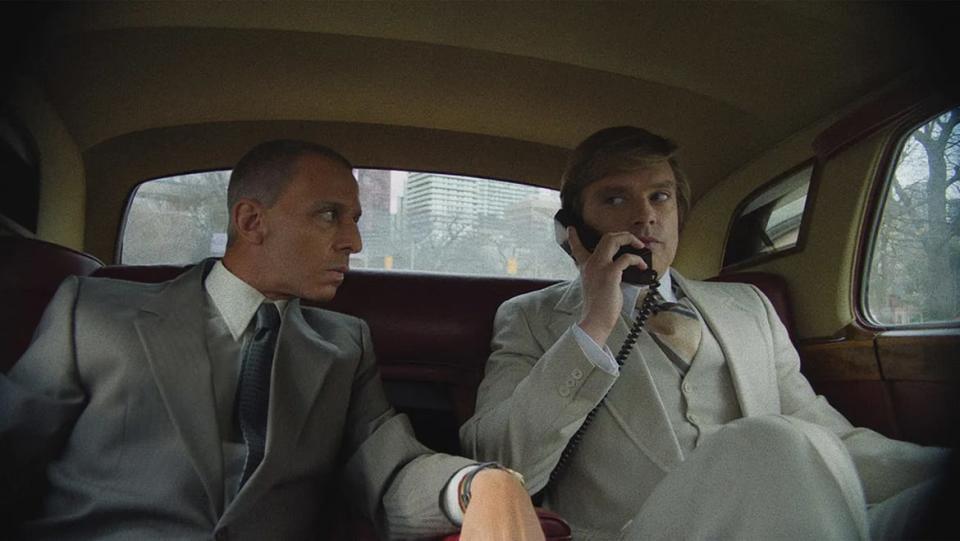Sebastian Stan Talks Oscar-Worthy ‘A Different Man’ and Playing Donald Trump

Sebastian Stan is more than just a Marvel standout, and he proves that in phenomenal fashion with A Different Man, Aaron Schimberg’s noir-ish tale of transformation, mania, and murder.
Initially encased in facial prosthetics, Stan is extraordinary as Edward, who finds a miracle cure for his neurofibromatosis (a condition that results in disfiguring tumors), only to wind up starring in an off-Broadway play about his former life that’s written by the neighbor (Renate Reinsve) for whom he pines and which ultimately features a stranger (Adam Pearson) who looks exactly like he once did.
Charting Edward’s constantly shifting feelings about his past and present selves with agility and intensity, the actor crafts a complex portrait of desire, discomfort, confusion, and self-destruction. Like a one-man funhouse mirror, he’s a lost soul trying to lucidly see and accept himself, and Stan conveys his upheaval with equal parts poignancy, creepiness, and absurdity.
Premiering in theaters on Sept. 20, A Different Man is one of the year’s best, and further confirmation that Stan is an artist of impressive versatility. While best known as the Marvel Cinematic Universe’s metal-armed Winter Soldier, he’s spent his downtime from superheroics tackling a wide variety of projects, be they Craig Gillespie’s ripped-from-the-headlines I, Tonya and Pam & Tommy, Mimi Cave’s horrific thriller Fresh, or the upcoming The Apprentice, Ali Abbasi’s controversial biographical drama in which he plays a young Donald Trump.
Without much fanfare, Stan has become a bold Hollywood risk-taker, moving between blockbusters and independent productions—not to mention genres—with confidence and skill. His latest, however, is his crowning achievement to date, demonstrating not only his gift for intricate characterizations but also for comedy, which helps augment the film’s head-spinning surrealism and darkness. A performance that mutates and surprises with every whiplash plot twist, it’s a bona fide tour-de-force.

Adam Pearson and Sebastian Stan in A Different Man.
Stan isn’t done with comic-book spectaculars quite yet; Thunderbolts*, his newest Marvel assignment, arrives next summer. Nonetheless, his work in A Different Man is so tremendous that, in a just world, it would herald a future of even more daring roles. For now, however, he’s concentrating on Schimberg’s masterful feature, which he discussed with us—along with a bit about his upcoming turn as Trump—in advance of the film’s debut.
‘Different Man’: Sebastian Stan’s Mind-Blowing New Psychosexual Thriller
A Different Man was shot in NYC. Did you venture out into the city in your Edward prosthetics to see what the reactions would be?
I did. That was probably one of the most important things I got to do for this. Mike Marino designed the prosthetics, and he was doing my prosthetics and then also working on The Marvelous Mrs. Maisel. As a result, sometimes I was getting ready for us even though I wasn’t working until much later in the day. I would end up in the prosthetics for hours before we would start, and that’s when I would walk around.
It was extremely informative for me to feel that, because nobody doubted me. Nobody thought I was an actor in prosthetics. I could feel the tension around me in a way. I was very nervous doing that, and in those situations, people are either very good actors or they don’t lie very well [laughs].
Did you have any particularly notable interactions during those outings?
I went to my old coffee shop and saw people I knew, and they obviously didn’t know it was me, and I walked and sat around. The most connected interaction with anybody was this little girl who came up to me and tried talking to me, and her mom, being a parent, got worried that she was disturbing me or something. It was just interesting how that whole interaction played out, because this little girl was being inquisitive, and she wasn’t making any judgements; she was just curious. Whereas everyone else in New York, as you know, would either avoid you altogether and not even look at you, or they’d be really abrasive and direct and stare and take a picture.
How do you prepare for a role that’s equally reliant on wearing—and not wearing—prosthetics?
Every job is different, but you have to start on the inside; that’s what you’re always working on. You have to find the character in you. Then, the exterior stuff is icing on the cake that informs behavior and helps in other ways. Again, it’s about building confidence.
Thankfully, we shot a lot of early Edward first, so I had the experience in the prosthetics to inform the later part of the movie, when I don’t. I think that was valuable. But I did the usual research. I spoke to Dr. Kaleb Yohay, who’s the head of the neurofibromatosis program at NYU, and had him look at the script and tell me if this would ever be possible, what it would be like, and what the feeling in the community is about this condition. Then, obviously, I also had Adam. And you can go on YouTube and find a lot of people with disfigurements and disabilities who talk about growing up and their experiences. That was very informative.
That had to have been an interesting experience.
The last piece that really helped me was Elna Baker, who’s written a book and spoken on the This American Life podcast about her experience losing 200lb and becoming virtually unrecognizable to people from before—much like Edward—and the crisis of identity and self-truth she went through as a result of it. It was really helpful for me to hear her journey, because there were a lot of parallels to our story, weirdly.
How did you first come to A Different Man?
I have a cheat sheet of things that I now look for, and it’s really about character, director, and story. I don’t discriminate based on what it’s about or what the genre is; it really is about, what is the character, who’s the director, and is there something to this story that I can learn from, or is it asking certain questions that can motivate and inspire. That’s how I approach it.
My agent sent me the script and said, this filmmaker, you have to know him, you have to watch his movies. I watched Chained for Life and was blown away, and I thought, man, this is so crazy. The way it was written, you just don’t come across stuff like this unless you’re reading a play that was written decades ago. It was original, it was unique, and it wasn’t about anyone we know. It just stood on its own.

Sebastian Stan in A Different Man.
Was there a trick to maintaining a grip on the core of your character as the film spirals into Edward becoming Guy while still being Edward and then playing a theatrical version of himself and on and on?
Early on, I thought about what the audience’s experience was going to be, and the fact that you had to recognize Edward even though he didn’t look the same. There had to be things about him that were familiar, like his body language. There were things I was very conscious of, but again, only until the prosthetics happened, at which point a whole other world took over.
For me, I think about when I was a little kid. It was so fun in high school to get up and do plays, and you’d change and put on [costumes] and you weren’t always playing yourself; you were allowed to play all kinds of characters. I still get excited and come alive when I think about a transformative situation, if it makes sense, because it unlocks things in a very different way. So yeah, I look for that sometimes more, or I have been. But I also simply think there’s great value in doing something that’s very small and still and personal in a very different way.
In this, when you have such a massive change, it really affects everything. You really forget yourself, and that’s the goal.
Donald Trump Rapes and Pillages His Way Through the Scathing ‘The Apprentice’
It seems like, outside your Marvel work, you’re constantly searching for daring and/or off-the-beaten-path parts. Is that deliberate?
Yeah. I’ve thought about, if I hadn’t had Marvel, would I have been making the same creative choices? I don’t know. I really lucked out with this character [The Winter Soldier] for 15 years. It allowed me to explore a certain kind of thing. He’s not a typical leading-man character; he’s an antagonist and he’s got a backstory and all these things. But it allowed me to explore a level of acting which I enjoyed.
At some point, I think I thought, “Oh, I’m interested in these other things too.” So I know I was making a conscious decision to want to continue to keep myself guessing, and hopefully other people too. I believe in discomfort a lot. This is the thing with movies like this—you can’t help but get very philosophical. But life is discomfort. Change is the only way you evolve. I think the Marvel stuff is a different kind of challenge, because you’re like, what else can I discover about this character after so many years? But in terms of doing stuff outside of Marvel, I had a desire to take on stuff that scared me.
Unfortunately, as you know from watching a lot of movies, few films like this are being done at a big budget level. Those are [done by] Scorsese and David O. Russell and guys that I’ve always tried to get to see me, but I haven’t been able to. That’s a different level of big-budget kind of film that I haven’t gotten to yet.

Jeremy Strong and Sebastian Stan in The Apprentice.
I've seen The Apprentice, and you’re great in it too. Are you prepared for the inevitable hoopla that’ll greet its release?
I don’t know what it’s going to be, because it’s already been here. It’s all been hoopla since we started making it because it was so crazy, and so hard to make. The process was so intense, and the last day of shooting was January 31, and now we’re in the same year and talking about the movie coming out. I had no idea it was even going to come out. It’s hard for me to know what to expect with it in our unpredictable world.
‘The Apprentice’ Trailer Reveals New Footage of Damning, Scandalous Trump Film
Plus, it’s coming out at the tail end of a presidential race.
I think the whole point of it all is to experience movies the way you’re experiencing a book, or writing, or a painting. We have to be able to experience it, because I think that’s when we gain something deeper of value than if we’re just always analyzing everything to the nth degree. Unfortunately, everyone doesn’t have your level of commitment and research and passion behind understanding movies; we write them off because of one clickbait thing, thinking, “Ah, I know what that is.” Well, okay, but the whole point of it is to have the experience and the conversation around it.
I think this filmmaker, Ali Abbasi is really talented, and he’s saying something interesting. I’m curious about the reaction, but yeah, I don’t know.
Considering the feedback I normally receive about politically oriented films, I’m sure the reaction won’t be tempered.
Of course. It’s always tough with that, but I think the movie is, at least as far as I understood and experienced it, on a deeper human level than on the politics of it. I think one thing that leads me to believe that we might need the film is because whenever people engage with [Trump], he’s being discussed like this distant thing that’s either closer to God or to Hell, and nowhere in between. We have to normalize the situation, and him, in a way that we can process. Because with the extreme mindset, I don’t feel you understand anything.
Get the Daily Beast's biggest scoops and scandals delivered right to your inbox. Sign up now.
Stay informed and gain unlimited access to the Daily Beast's unmatched reporting. Subscribe now.

 Yahoo Lifestyle
Yahoo Lifestyle 
